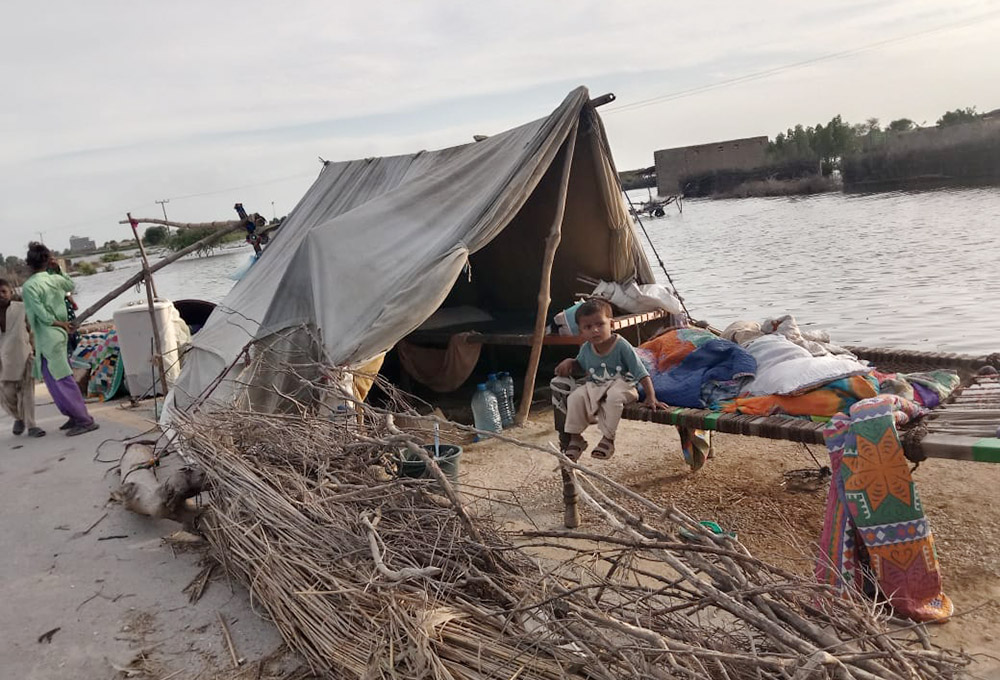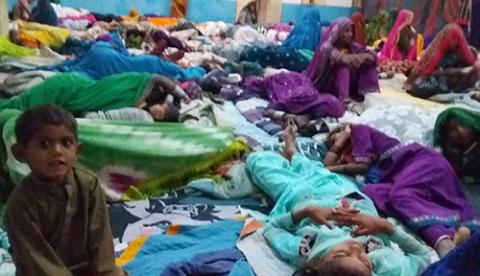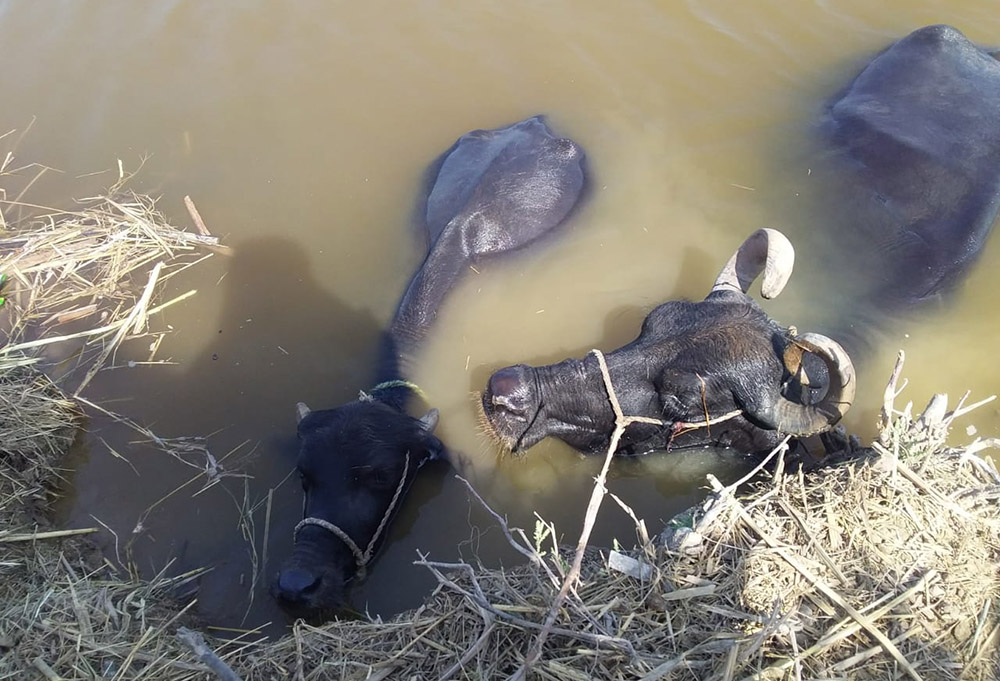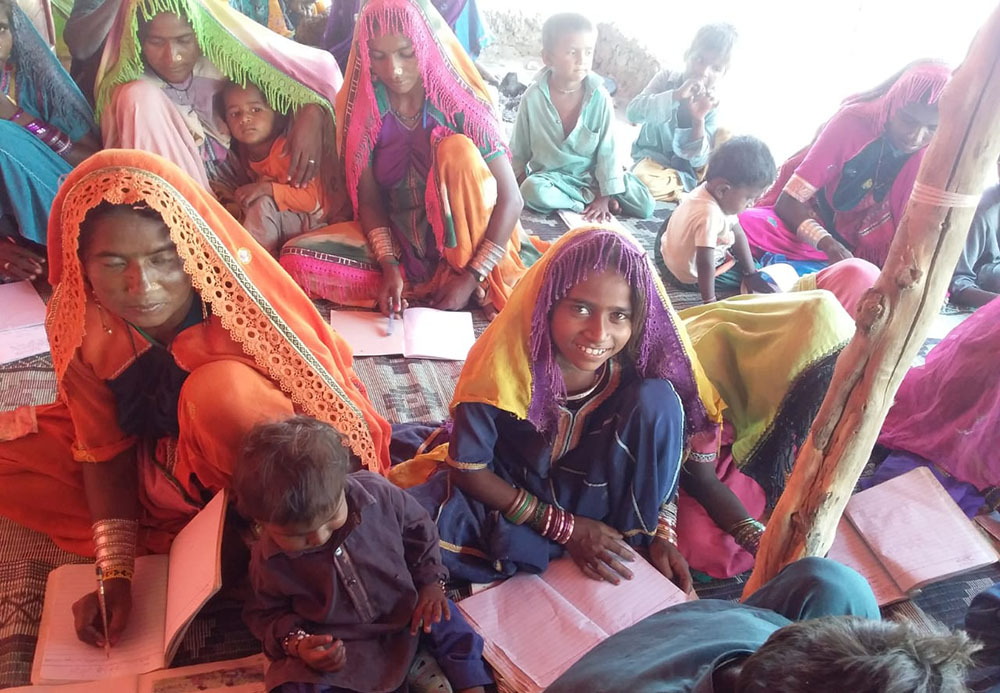
A family home beside floodwaters in the province of Sindh in Pakistan in 2022 (Courtesy of Emer Manning)
Pakistan is a country that has always fascinated me. Today, it is known as the Islamic Republic of Pakistan, but when the Presentation Sisters from Ireland arrived in 1895, it was still part of the subcontinent of India. The separation into two countries occurred when India became independent from the British in 1947.
The Sisters of the Presentation of the Blessed Virgin Mary have been involved in social work and informal and formal education, managing schools for Muslims, Hindus and Christians throughout these 128 years. It is a country of much conflict and oppression but also of resilience and intercultural cooperation.
The Christian population is small, and although there are small numbers of sisters, they do amazing work. Today in Pakistan there are 40 Pakistani Presentation Sisters and six Irish.
Our sisters work both in the Punjab and in Sindh, in the southern area of the country. The capital of Sindh and Pakistan's largest city, Karachi, has fewer than 20 million people. In the summer of 2022, Sindh province was dangerously flooded and the people have not totally recovered.
I will never forget that flood of 2022. Before it, our Sindh province — once a desert — had become a fertile plain, thanks to a system of canals built when the British occupied the area. When the occupiers left, the Pakistan government developed the system and kept it productive.

Overnight sleeping accommodations during flooding in Sindh, Pakistan, in 2022 (Courtesy of Emer Manning)
The rain changed all of this positive development to a disaster when it came down in torrents for about two months, beginning in July 2022. At the time of flooding, some of the canals were deliberately breached to save other areas.
Some families fled the area but others had to stay and survive as best they could. Our response to the disaster, as sisters, was to go from village to village to see what the needs were and to help with food distribution.
As we did this, one of our primary tasks became that of listening to the grief of the people and also hearing about their efforts to survive. The resilience of the people was truly amazing.
The flooding was unbelievable. Ramesh, a friend of mine, told me that he was trying to save his onion plants by emptying water from between the drill holes where they were planted; it was a crop he depended on for income. However, as the rain continued to fall, it washed away his entire crop.
This was not the only tragedy he endured. His suffering was increased by his position as a bonded laborer, in which capacity he borrowed money from a landowner in order to survive. Under this contract, Ramesh was responsible for paying half the costs of the seeds, fertilizer and land preparation for the owner's wheat field.
Advertisement
When the floods destroyed the entire field, the crop was completely gone, and Ramesh found himself in debt. His investment to provide for his daily needs was gone. Unfortunately, this debt was compounded when he had to pay for half the seeds and fertilizer for the new crop scheduled to be planted.
However, in thinking that at least he might have half of this new harvest, he was wrong. The landlord would not allow Ramesh to use half of the new crop of the wheat — as was his right. Instead, the landlord said "You have a debt, so you are not due any of this" — leaving the family penniless. They had no cash and no hope of earning any until the next harvest.
This, as can be imagined, was only one such story. Many families like Ramesh's had the same experience.
But there were other stories of how ingenuity helped people survive. Mithu lived in a village where there was a literacy center for women, men, boys and girls who have never been to school. An enterprising man, Mithu had been hosting the classes in his own shelter and helping the teacher organize the classes. Although a student himself, he had an air of authority, which was a help to the very shy teacher, and between the two of them the sessions were going quite well.

Buffalo bathe beside the literacy center in the province of Sindh in Pakistan (Courtesy of Emer Manning)
Then the rains came. The entire village was flooded to such an extent that all the people moved to the side of the road. They built shelters with sticks and plastic and had to go back and forth through waist-high water to get beds, bedding and cooking utensils from their flooded mud houses.
Thinking ahead, Mithu—ever enterprising — had decided to build a larger shelter than the others, without saying why. He had the idea that, since the people would no longer be able to work, they could still continue the literacy sessions, and he already had the space where it could happen. The people were thrilled to think they could continue their classes.
This was amazing to me, considering all the people had been through. I saw it for myself: men, women, boys and girls sitting together and studying with interest for about two hours during the day rather than at night, as had been necessary when everyone was working. And now, they had daylight to study by.
These two stories are just a glimpse of how the tribal people of Sindh coped during the floods. I have been working here for 23 years and these floods have again filled my heart with amazement and admiration at the resilience of the people. There has been hope, courage, joy, and laughter as well as tears.

Women study in the literacy class during the floods in the province of Sindh in Pakistan in 2022. (Courtesy of Emer Manning)
As I continue to work among the many villages of Sindh, I think back on my life growing up in a small village in Ireland and beginning my religious life in Youghal, Ireland. I was asked to come to Pakistan when I was 30 years old.
It has been a blessing to be so warmly welcomed into the lives of the people. Every day, I feel blessed traveling around Sindh and seeing people's faces light up with love and joy as the catechists and the sisters visit. There is tea, sharing of life's struggles and joys, and all the while children play around us, being inventive with few resources and yet full of joy.
The poverty is extreme, but the humanity is like precious gold.
Now, even though the floods are over, there is still hunger, illness and endless needs for food for those who "have not eaten since yesterday" and for shelter, roofs for houses, water pumps, sewing machines for women to earn income, medicines and doctors. In spite of all of this, the people are once again sowing crops for the landlords, hoping to get their share of the profits, often receiving little return for a lot of labor.
Easter this year was especially joyful. People came early to celebrate and stayed overnight for the first time in three years. They arrived at church by foot, motorbike and rickshaw. The Christian story brings hope and assurance that God is near. Christ is truly risen.





